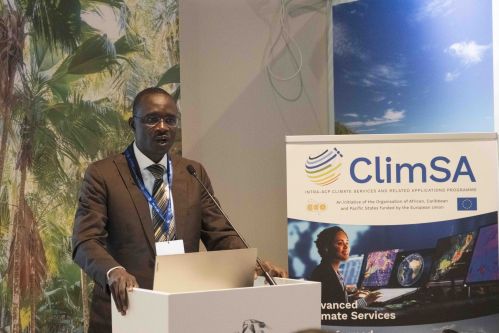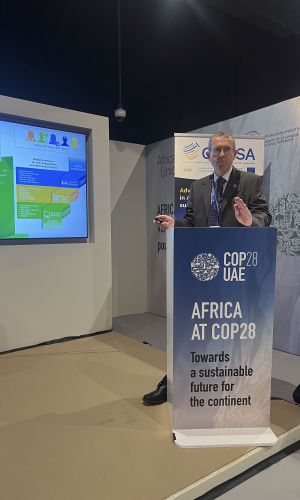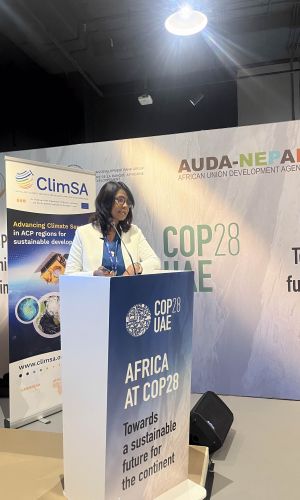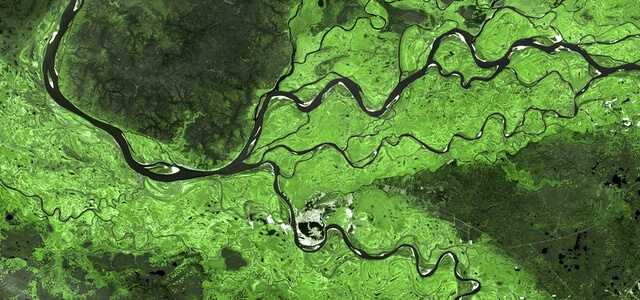On 10 December 2023, The OACPS Secretariat organized, in conjunction with the African Union Commission, the Indian Ocean Commission, and several African regional climate centres, including IGAD Climate Prediction and Applications Center (ICPAC), AGRHYMET, African Center for Meteorology Applications for Development (ACMAD), SADC Climate Service Center (SADC-CSC), and the Climate and Application Center for Central Africa (CAPC-AC).
The recording of the event is available here: VIDEO RECORDING

This event highlighted the pivotal role of User Interface Platforms (UIPs) in enhancing climate services. This event recently concluded COP28 the featured collaborative side event that brought together key stakeholders dedicated to advancing climate services and regional collaboration. The theme of, "Fostering Regional User Interfaces for Informed Climate Decision-Making," underscored the significance of establishing effective communication channels and partnerships for climate resilience.
This event was convened under the Intra-ACP Climate Services and Related Applications (ClimSA) programme, funded by the European Union under the 11th European Development Fund, aimed to strengthen the climate services value chain. Eight Regional Climate Centers across the African, Caribbean, and Pacific States (OACPS) regions collaborate to provide technical support, capacity building, and institution strengthening. With technical partners such as the World Meteorological Organization (WMO), the European Commission's Joint Research Centre (JRC), and the European Organisation for the Exploitation of Meteorological Satellites (EUMETSAT), ClimSA aimed to enhance interaction between users, researchers, and climate service providers through UIPs.
The discussion of this last side event was to launch the science - policy – dialogue for triggering climate mainstreaming into policy and strategies.
Dr Wasambo of the African Union Commission highlighted how the African Climate Summit Declaration committed African countries and regions to mainstream climate services into all public policies and strategies so to achieve the Africa 2063 targets to achieve sustainable development and build resilience.

Professor Chris Hewett from WMO presented the purpose of setting up a UIP, a collaborative effort, in line with WMO guidelines, that is to facilitate the sharing of best practices among Regional Climate Centers and strengthening regional collaboration and partnerships to address climate challenges. This collaborative effort aligned with the ClimSA program's broader goals and the Global Framework for Climate Services (GFCS), contributing to enhanced climate resilience and informed decision-making.

Surekha Ramessur, Programme Officer at the SADC Climate Service Centre, delivered a comprehensive presentation introducing the SADC Climate Services User Interface Platforms (UIPs) as part of the SADC ClimSA programme component. Among the main outputs of the activities are:
Stakeholder consultations with key regional organizations that have provided valuable recommendations for further enhancing and customizing UIPs; the formal launch of the Community of Practice (CoP) and online Helpdesk, and the commitment of stakeholders to advancing climate services and informed decision-making in the SADC region.

Dr. Romeo Sosthène Nkurunziza of the African Centre of Meteorological Applications for Development (ACMAD) delivered an insightful presentation on "Fostering Regional User Interface Platform for Informed Climate Decision-Making: Water and Health Users Interface Platforms and Continental Climate Outlooks. Dr. Nkurunziza highlighted the Continental User Interface Platform for the Health and Water Sectors, created during the first workshop on the Continental User Interface Platform for DRR, Agriculture, Water, and Health. The platform aims to deliver precise and concise information to inform early warnings for health and water-related risks, including monitoring heavy rains, floods, droughts, high-temperature watches, and issuing warnings/alerts.
The second part of the event was directed to the policymaker dialogue. Heads of institutions from the OACPS Secretariat, IOC, AUC, CILSS/AGRHYMET discussed the limitation of the current format of climate services to draw policy development. The presentation emphasized the need for continuous dialogue with policymakers and addressing barriers to effective climate services, including limited data access and awareness among policymakers. The concluding remarks underscored the importance of breaking barriers through the User Interface Platform for policy makers, and the collaborative efforts required to develop, deliver, and use identified products and services for climate resilience.
Additionally, increasing awareness among policymakers about the availability of impact-based forecasting is imperative, considering the limited uptake of information in the operations of user organizations due to data access restrictions and national policy constraints. Overcoming these challenges is pivotal for advancing climate resilience and ensuring effective decision-making in the face of climate-related risks.
In conclusion, the collaborative side event successfully brought together key stakeholders from various regional climate centres, fostering a united front in addressing climate challenges and building a more resilient future.

